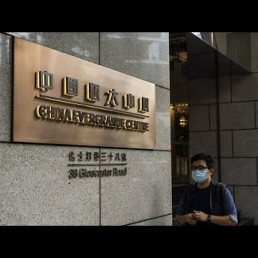
Video reading area
Origin Ten Technology is driven by a desire to make the world a better place.
This area has been designed to improve Video accessibility for user with hearing problems and for those who just prefer to read.
Evergrande Never Going to Be China’s ‘Lehman Moment:’ Qazi By Bloomberg Markets and Finance
You don’t expect a disorderly collapse forever Grand. How much of a relief is this for evergrande, Bond holders, as well as a broader property sector?
Well, you know Sherry this was never going to be China’s Lehman moment, despite that being the initial reaction and I think it’s become very clear that over the last several weeks that Chinese data tour authorities are pretty deeply involved in managing. This crisis, all the way from offloading evergrande projects to other developers to working with the company to come up with a debt restructuring plan. Now, there is going to be pain for some parties involved. Foreign investors obviously are the most nervous of the
Group, whereas how Chinese households are on the top of the list of people or entities that need to be taken care of. Nevertheless, again, there is no Lehman like Panic or crisis. That is happening. That said there is a broader property Market distress story that investors need to keep an eye on it because the Chinese property Market is going to be under pressure for the foreseeable future regardless of what happens with evergrande.
The politburo meeting recently, signaling potential more easing in the property. Sector change the narrative at all.
So, you know, we got back some data in November and looked at it. And yes, there has been some amounts of easing. As far as a property sector is concerned. Property firms are able to get more bank loans, which is a big change from the previous quarter. They were able to sell more bonds. So yes, you are seeing some amounts of loosening of that of credit policy there, but it may not be enough, you know, you could see the sector do a little bit better. It’s painting. He’s compared to where it was in the third quarter.
Which is downright horrible, but the long-term picture, if the economy is transitioning away from this high debt, High investment high growth model. Then by definition, would mean that the property sector is going to have a pretty bumpy road ahead. But that high debt, high growth investment model has also benefited just regular wealth holders, right? What happens to Consumer sentiment not to mention the knock-on effect of the dozens of industries that rely on the property sector, but when it
Is to the the average Chinese consumer. Whose wealth is tied up in property. What does that mean? For the Chinese consumer and consumption going forward? Yeah. That’s why I think protecting house goals has become such a key priority for policymakers in Beijing because you have so many Chinese households who are not only waiting on being made whole by getting their partners that they paid for years ago. But I’ve also bought wealth management products and are tied in to ever Grands a debt and they can’t be made to Bear the
Boss is here. The reality is that whatever is happening in the property sector. Right now is most likely going to have some impact on consumption down the road as well. Dampening of consumer sentiment consumer confidence, but that’s exactly the sort of thing. I think right. Now that Beijing is stored is trying to stab off as it tries to ring-fence, you know, did the crisis happening with ever grad?
Was it? Triple? I’ll cut this week. Any kind of inflection point or does the The Prudent monetary policy continued? You see kind of more of a lean towards easing given how politically sensitive this next year is.
Well, look, there is going to be easing in 2022 because of what you just said because it’s a politically sensitive year, but I think this week’s are our Cod, you know, a lot of Market commentators have gotten too giddy at trying to claim that this is the inflection point. I think it’s too early to call that you know dark was rather small and we also don’t know if it’s actually reaching the real economy. The question that we need to really be tracking is is credit making its way to the real economy and the number two within that
Which types of firms are actually getting access to to loans, you know, is it just going to be large firms again, or is it going to be directed towards smes our latest data suggests. That smu’s are actually still having a pretty hard time getting credit and large firms are not. So those are the sorts of things access by companies that we need to be more concerned. But rather than just what’s coming down the pipeline from the supply side.
It’s a deleveraging drive, serious this time because particularly, as you mentioned, these political sensitivities are going into next year. Is there going to be more of? Or I should say less of a willingness to be able to go hard on these companies. So 2022 is naturally going to be the exception year because of the party Congress and President. She’s you know, third term and all of that. But I think there has been a paradigm shift inside of
I know that old Playbook that we just reference, has certainly gone out the window and the new playbook. If there is a transition away from this, you know, cutting back on dead and so forth. And that means there is seriousness in terms of deleveraging this year. Most certainly we’ve seen, you know, corporate borrowing fall quarter after quarter. Even official data has shown a slow down and credit growth. All throughout this year, counter to What markets were expecting at the beginning. So deleveraging, and being serious about that is going to have to be
part of the package. If the Chinese economy is to transition to a more sustainable growth Pace. What are the metrics that you’ll be following through the next year to make sure that China is actually adhering to those deleveraging and Regulatory Crackdown the efforts that they have had ongoing for the past year, or perhaps that will give you a signal that they’re veering away from it.
So, you know, again it’s going to be looking Beyond next year, but beyond just 2022, you know, we’re going to be tracking corporate borrowing corporate credit access, especially looking at credit access between State and private firms, large firms. And smes. Also. What sectors are getting? Is it the traditional sectors such as the industrial sectors that are getting preferential credit access again, or are we seeing better access for these new economy firms. So those are going to be the key elements of what we continue.
To look at and same thing with in property, you know, what, parts of the property Market continued to get some amounts of credit support and which others do not as we look at this. Restructuring going on within the sector.








